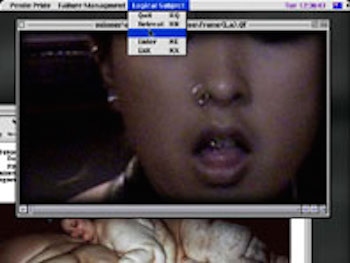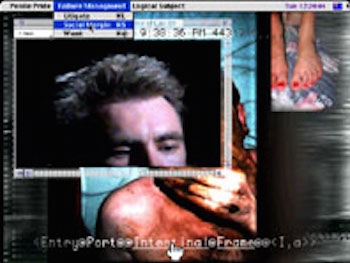Terrence Handscomb
Space Invaders
18 Apr — 27 Apr 1998
Terrence Handscomb's Space Invaders is a culmination of the artist's research into the reproductive power of new technologies. Handscomb makes it his personal project to extend the boundaries of what is "normal" and what we are capable of imagining in our daily lives. Firstly, he rigorously pursues technology as a tool, making himself au fait with all the possibilities available to us today. Secondly, he actively engages our inbuilt sense of compulsory morality by forcing us to view things that we would normally avoid because we find them shocking. Thirdly, he examines the point at which these two factors, technology and morality, interface, and how advances in the former pose new questions for the latter. Handscomb is not a preacher, and what he offers the viewer is a chance to make their own decisions about how much they want to see. In an interactive programme, the viewer uses a mouse to navigate a video projection in a darkened room. Various "gates" (penile, anal, occular, etc...) are on perpetual rotation. If you "enter" these spaces, you must be prepared for an audio-visual assault.
Handscomb's abiding obsessions include serial murderers, coprophagists, fatal accidents, penile surgery, and hard-core fisting, among other things. Dedicated netsurfers will recognise many of the images in Handscomb's gallery, as they are circulated with regularity on the web.
But Handscomb's work is not just about technology, it's about the human psyche and its perpetual fascination with horror. As some kind of latter-day digital Bosch, Handscomb creates a garden of computerised "delights." The images are (arguably) "awful" and "shocking" but they continue to fascinate and enjoy currency. Oddly, Handscomb has chosen to intersperse these hardcore images randomly with very ordinary video footage, decontexualising our everyday lives and asking the question, "What is normal?" We have to ask ourselves, as the often beautiful and seductive nature of his finely-constructed labyrinthine work raises the question, who decides what is right and wrong? If beauty is objective (and his work is littered with obese women and limbless women) then so too surely is morality.
Space Invaders makes a strongly anti-censorship statement. In the end, the viewer must be their own agent of moral judgement, and not accept a state-sanctioned pre-packaged "commandment" on what is right or decent.


